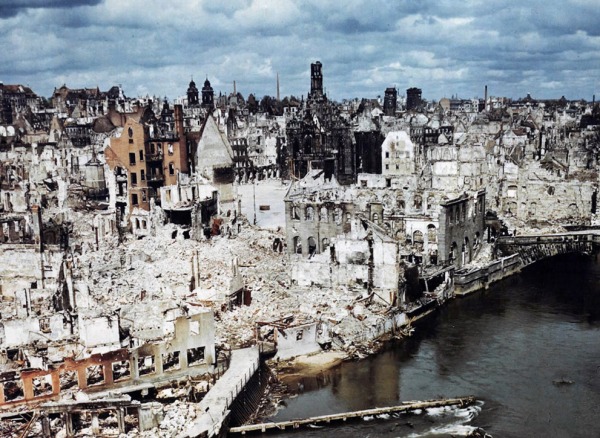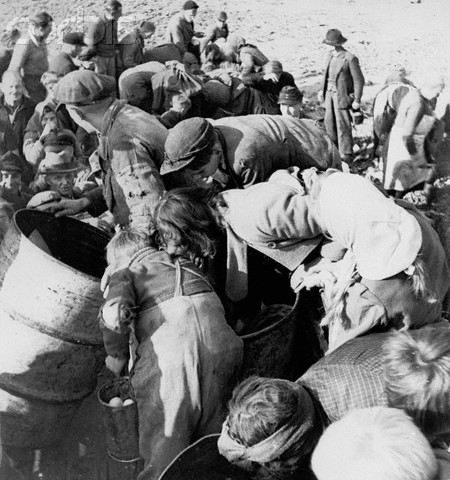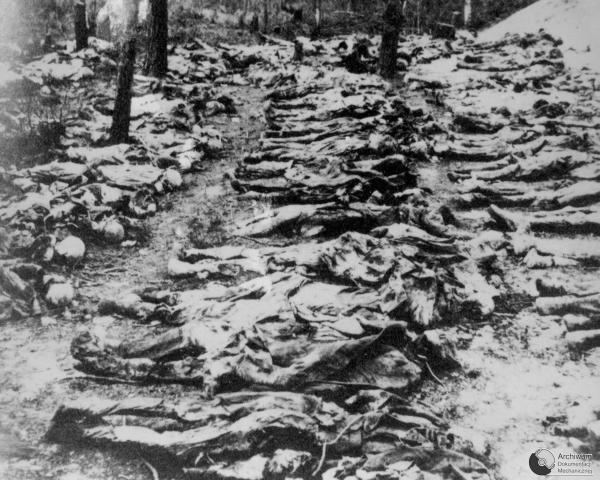A free e-book by Dr. Michael F. Connors, published by the Institute for Historical Review (IHR) Second edition: 1996. Approx. 35 pages. The book goes through the long history of Anti-Germanism but these selections are taken from the end of the book and deal primarily with the hatred, hypocrisy of and iniquities of the post-war years by the victors, and the consequences for the German people specifically, and which continue through to the present day. But one must also bear in mind the greater implications for all humanity, as this pattern continues to this day. While fairly old now, the book is no less relevant. I found it to be well worth the read and would highly recommend it. I have added highlights to what I felt are the most salient points from my own perspective, as well as related images.
Unconditional Hatred
During World War II this stream of Germanophobic literature reached flood tide proportions. The situation in the cinema and radio was, if anything, worse. The “hate Germany” motive seemed uppermost even in our top level strategic planning. Indeed, our entire wartime policy can very well be summed up as one of “Unconditional Hatred,” to borrow Russell Grenfell’s apt term. This driving, irrational impulse seemed to operate without reference to, and even to the exclusion of, all other goals. No thought was given to the power balance situation of tomorrow or the day after, to the insane folly of substituting the inherently far more menacing power of the U.S.S.R. for that of Germany, Italy and Japan in Europe and the Far East. One might have imagined that the alliances and enmities of the period had been given eternal certification in Heaven.84
Had there been even a modicum of rational planning from the standpoint of enlightened self-interest, we would not, we could not, have made “Unconditional Surrender” and the diabolical “Morgenthau Plan” the bases of our policy. Had we not permitted reason and good sense to be consumed in the fires of vindictive passion, we would never have assented to the fateful innovation of constituting ourselves at once as judge, jury, prosecutor, and hangman of defeated military and political leaders at Nuremberg. Had we not permitted ourselves to be moved by the base spirit of hypocrisy, our much vaunted sense of humanitarian values and moral indignation would never have permitted us to wink at and even encourage the “Crimes Against Humanity” perpetrated by the Poles, Czechs, and Russians against 14,000,000 Eastern Germans in 1945-1946.85
A Gallery of expelled German refugees:
Post-World War II Germanophobia
After World War II there was a marked lessening of interest in Germany with the consequence that there was a considerable decline in the current production of literature concerned with that country. Be that as it may, however, books and articles about Germany are still fairly plentiful. Hence the question arises: Has there been any significant development of a corrective literature to counter the tendentious interpretations of previous years? To the shame of honest historiography, the answer must be a very decided negative. There is a continuing “historical blackout,” to borrow Harry Elmer Barnes’ phrase, where Germany is concerned. The older historians, of the most part, manifest a stubborn reluctance to surrender their fixed delusions. The younger ones have been so indoctrinated during their entire education careers that they seem completely unaware of the challenge thus presented to their scholarship. The sole exception to this is a veritable handful of revisionist historians. Thus far, however, their efforts have been mainly limited, by and large, to tracing the origins of World War II and the genesis of Pearl Harbor. Little attention of a revisionist nature has been accorded to German history as such by non-German scholars.
Typical of postwar attempts by Western historians to perpetuate the Germanophobic myth was Hans Kohn’s article “Rethinking Recent German History.”86 Kohn resuscitated all the stock villains of German history who had long been so dear to the hearts of melodramatic anti-German writers: Bismarck as the supposed embodiment of Machiavellian power politics; the wicked Prussian and German ruling classes; that nebulous demon, German intellectual development and all the rest of the tiresome litany. He even attacked those who “attempt to show that the pernicious trends in modern German history were common to European civilization as a whole.” For example, he cites the charge that Gobineau’s racism influenced Wagner, though it is an undeniable fact. He writes:
But isolated trends in Western nations become dominant ideas in Germany. Kings, diplomats, and demagogues, who succumbed to the demoniac lure of power, existed elsewhere; but the inclination of the majority of the German people and of German intellectuals to accept them uncritically is the troubling problem.
Further on he relates that the Nazi “deviation from the main lines of European development … started long before Hitler.” He quotes with obvious approval the hackneyed view that “National Socialism was made possible by the separating of German political thought from Western European thought …” This supposed separation he traces back to Fichte and Hegel. Perhaps it should not surprise us that even the present urgent state of world affairs had had little influence upon Mr. Kohn’s tendentious views of German history. He still seems to feel we can afford the luxury of baiting Germany, as is evident from some of his recent articles in which he delivers his accustomed wearying preachments to the Germans on the alleged pernicious influences in their history.87
A widely read college level text by Louis L. Snyder, gathers between its covers all the threadbare cliches and superstitions ever penned by Germanophobic writers.88 Snyder is virtually obsessed with his favorite delusions of intellectual history. To read his account, one might imagine that pre-Hitlerite Germany had some sort of monopoly on “irrationalism,” “racism,” and “anti-Semitism.”
[…]
But undoubtedly the most widely publicized book dealing with Germany to appear in America since the end of World War II had been William L. Shirer’s The Rise and Fall of the Third Reich.95 For many months in succession the Shirer volume held first place in the nonfictional category of the best seller list. When one considers the sheer bulk of the volume and the turgid if ingratiating style in which it is written, this is a remarkable tribute to the manner in which skilled promoters can contrive popularity. But far more important, The Rise and Fall of the Third Reich, embodying as it does the very worst features of the Germanophobic propaganda of 1933-1945, contributes very little to an honest understanding of German history, its publicity buildup and the rave reviews to the contrary notwithstanding. Again and again the reader is sharply reminded of the author’s bias against not merely the Nazis but the entire German people. For example, as early as page five he writes that “the German people” were “a natural instrument which he [Hitler, that is] was able to shape to his own sinister ends.” And again we are told96 that Bismarck, Kaiser Wilhelm II, and HItler left a common stamp upon the German people in the form of a “lust for power and domination, a passion for unbridled militarism, a contempt for democracy and individual freedom and a longing for authority, for authoritarianism.” And once more in thundering tones of pontifical certitude it is asserted that “Nazism and the Third Reich … were but a logical continuation of German history.” 97
Shirer gives scarcely a hint as to the real reason for the advent of Nazism: the fact that Germany was saddled with a Draconian peace, the terms of which were mitigated through the years but slightly and then haltingly and with ill grace. His account of the coming of World War II simply takes no account of the findings of recent revisionist scholarship, as is perhaps to be expected, while his repeated sneers directed at the members of the anti-Nazi resistance within Germany only betray still further his basic and deep-seated antipathy to everybody and everything German. The appearance of such a work at this time when German and Western amity was never more urgently needed is distinctly to be regretted.
Even more regrettable, however, has been the emergence, in large part during the months following the seizure of Adolf Eichmann, of a body of horror literature alleging brutal German wartime crimes, mainly against the Jews of Europe, of such depravity and magnitude that readers might thereby be tempted to speculate that, whatever Allied statesmen did to provoke conflict with the Axis powers, they were entirely justified in taking such action.98 Should even the worst of these questionable charges against Germany be one day verified by some tribunal concerning whose impartiality there is agreement on all sides, it would still be necessary to remember that they were made possible by the war itself. Equally as important, they would have to be balanced off against the crimes perpetrated against the Germans by the Allies. Hitherto it had been customary only to cite those crimes attributed to Germany.
Allied ‘war crimes’
Certainly, the expulsion in 1945 of 14,000,000 Eastern Germans from their ancestral homeland by the Czechs, Poles, and Soviets with the tacit connivance of the Western Allies was a “war crime” by any standard. Moreover it took on distinctly macabre overtones when the discrepancy between the number expelled and those who actually reached Germany reached a possible three million mark.
Surely, too, the as yet little known fact that not Hitler but the British, by their own admission, initiated unrestricted bombing of civilian areas ought to merit for them membership in the select society of “war criminals.” The unbelieving reader need only consult the testimony of the British officials J. M. Spaight and Sir Arthur Harris, for incontrovertible proof of this charge.99 A decision of the British Air Ministry made on May 11, 1940, to attack targets in Western Germany instituted the practice of bombing purely civilian objectives. This “epoch-making event,” as F. J. P. Veale correctly describes it, marked an ominous departure from the rule that hostilities are to be limited to operations against enemy military forces alone.100 Spaight, former Principal Secretary of the Air Ministry, makes the following amazing comment on the decision of May 11, 1940:
Because we were doubtful about the psychological effect of propagandist distortion of the truth that it was we who started the strategic bombing offensive, we have shrunk from giving our great decision of May 11, 1940, the publicity it deserves. That surely was a mistake. It was a splendid decision.101
But the “great decision,” the “splendid decision” of May 11, 1940, which was ultimately to cost the lives of millions, including thousands of Mr. Spaight’s own countrymen, was to have an even more grisly sequel, for, according to Sir Charles Snow who had charge of selecting scientific personnel for war research in Great Britain in World War II, F. A. Lindemann, a Cabinet member and confidant of Churchill, produced in early 1942 a remarkable Cabinet paper on the subject of the strategic bombing of Germany:
It described, in quantitative terms, the effect on Germany of a British bombing offensive in the next eighteen months (approximately March 1942-September 1943). The paper laid down a strategic policy. The bombing must be directed essentially against German working-class houses. Middle-class houses have too much space round them, and so are bound to waste bombs …102
One wonders if it was the cultivated humanitarianism inherent in this decision to assure the death of more working class Germans per bomb which entitled the Allies, and in particular the British, to sit in moral judgment on German leaders at Nuremberg in 1946!
Can anyone doubt that the “Morgenthau Plan” which envisaged the destruction of the Ruhr mines, the pasteurization of a primarily industrial Germany, and the political dismemberment of Germany was a “war crime?” Had it been carried out rigorously, it would have been, as Freda Utley describe it, “the greatest act of genocide perpetrated in modern times … At least thirty million people would have died of starvation.”103 Though, fortunately, this diabolical scheme was never carried out to the letter, its spirit so permeated the occupational planning for Germany under the early “levels of industry” plans that for a long time after the war had ended Germans were deliberately kept on a diet far below that enjoyed by the inmates of Auschwitz up to almost the end of the war.
Who can doubt the criminal quality of the Soviet butchery of thousands of Polish officer in the Katyn forest in 1940? Even the Nuremberg tribunal resisted (albeit by inaction) Soviet attempts to lay that one at the door of Germany.104 Or perhaps the moral superiority of our “noble” Soviet allies, as we were fond of calling them, rested upon the manner in which they distinguished themselves in brutalizing the women of conquered lands. No doubt the enthusiastic response of the Soviet soldiery to the incitements of Ilya Ehrenburg to seize the women of Germany as the spoils of victory which resulted in the rape of half the women of Berlin alone lent substance to the pretensions of moral dignity assumed by the prosecuting powers at Nuremberg.105
German ‘guilt’ in perspective
Any final summation or balance sheet of German war crimes honestly verified, it may then be assumed, will most assuredly be balanced out by the sordid record of Germany’s hypocritically self-righteous enemies.
At the heart of the conviction that German World War II atrocities were quantitatively and qualitatively without parallel in the annals of human experience is the as yet unverified allegation that, in the pursuit of a macabre “Final Solution,” 6,000,000 Jews were cold-bloodedly murdered in gas chambers and before Einsatzkommando firing squads. The “evidence” presented in support of this charge to date had not been more persuasive than that used to substantiate the gruesome stories of German atrocity horrors spelled out in the long since discredited Bryce Report of 1915.
Neither the proceedings at Nuremberg in 1946 nor those associated with the recent trial of Adolf Eichmann were such as to inspire the confidence of the impartial investigator. Likewise the frenetic efforts of some academic scholars to prove the charge have fallen quite flat.106 But even if one should assume the worst to be true and, from the welter of conflicting numerical estimates as to the number of Jewish fatalities, accept the largest, 6,000,000, as undoubtedly correct, the number of victims of these German atrocities would still fall far short of the number of German, Japanese, and Italian non-combatants who perished at Allied hands as the result of mass population expulsions, saturation bombing of civilian centers, postwar deprivation, and Soviet massacres and political liquidations.
The simple fact then is that there is every reason to believe that a final accounting must exculpate Germany of any unique inhumanity in the waging of World War II, just as revisionist scholarship had exonerated her of sole or even primary guilt for the war itself.
Certainly there is not justification for those writers, and above all those academic “scholars,” in the West who continue to parrot the crudities and distortions of yesteryear. There is a monotonous uniformity in all their interpretations, the fundamental error of which lies in the fact that they, in assessing the reasons for the demise of democracy and the rise of Nazi totalitarianism in Germany, ascribe primary or even sole causality to factors supposedly indigenous to German history and society. The alleged “weakness” or “ineptitude” of democratic Germans is a theme which runs like a red thread through most such treatments. Coupled with a sinister streak” which has purportedly manifested itself in a diseased intellectual and political development and an alleged obsession with militarism, this usually suffices to “explain” for us “the course of German history” with its “logical culmination” in National Socialism.
As might be expected, such critics scarcely comment on the Allied “statesmen” at Versailles, who, in direct violation of the pre-Armistice agreements, imposed a punitive peace on the Reich. Nor have they much to say of the intransigence of Western “democratic” politicians who refused to make the slightest concessions to Germany during the interwar years. Non-German “guilt,” however much it might have contributed to the rise of Hitler, is never a popular subject with them.
Germany during the Weimar era produced in Gustav Stresemann and Heinrich Brüning two of the ablest statesmen of the present century. These men were thoroughly “democratic” to the core.107
Had either of these men been offered a fraction of the concessions to which they were entitled, the Weimar Republic could have been saved and the world spared the insane bloodbath of 1939-45, as well as the consequent alteration of the world balance of power to the advantage of the U.S.S.R. This was the portentous, terrifying essence of the most genuinely crucial period in modern world history; what seems, indeed, to have marked the real beginning of the Decline of the West. It is a story in which the impartial historian can assign at most a very minor role to German villainy.
If villains must be had, the historian must also look elsewhere: to Paris, to London, to Washington, and to Moscow, but only lastly to Berlin.
http://www.ihr.org/books/connors/dealinginhate.html
We are admonished time and time again to learn the lessons of history; lest we repeat past mistakes. But if we do not know the full and true history, and continue naively believing that our governments usually tell the truth, and blindly accept the biased propaganda we are fed to move us in order to do their bidding without critical thinking, then we are not only doomed to repeat historical mistakes, but we are doomed …period! And the same must be said in respect to trusting our media and the academics, etc to explain it all to us truthfully in retrospect. It essential to do your own research and to see the patterns!
I will be focusing on post-war Germany over the course of the week or so.











The anti-German agenda is so self-destructing to so many more peoples in Europe, not only the Germans in the occupation zone within Germany.
The Alldeutsche Bewegung is totally silenced and the countries that derived from Germans do themselves no service either. Be it the British Angelsachsen (and their worldwide post-colonies), or the Benelux people, the Swiss-Germans, the Germanic Italians, the Nordic nations or the Russians and other Slavs, and the French as well.
By demonizing Germany, they throw dirt onto their own fathers without even realizing it.
I remember our history teacher told us horror stories and stressed that Germans are genetically predisposed to evil.
You wouldn’t believe the stories he told us..
Unfortunately shit like that stocks to a young childs mind, and makes deprogramming more complicated..
That is why only those who have experienced the cognitive dissonance and started the journey to spiritual freedom will benefit from this excellent site. The still closed conditioned mind will find nothing useful here..
I have been puzzled on how the jews managed to brainwash “almost everyone” for so long?
However their tactics, it is of course possible to de-programme these “almost everyone”.
And thanks to this site, the healing gets a real boost 🙂
I have not seen any information about the English, mad, German-hater no 1, Sefton Delmer on this site?
If you really want to see how Anglo German-hating was organised during WW2, check this awful psychopathic person and his organisation!
“I have been puzzled on how the jews managed to brainwash “almost everyone” for so long?”
Yeah, it is really astonishing. That a small country in the size of Texas, still suffering from the Treaty of Versailles, aimed world domination and therefore started a war on 4 fronts is something what only idiots believe you should expect. But the opposite is true. This is the current narrative accepted by everybody.
Manipulation is relatively simple. People have the need to release frustration, just give them something to hate. Think of the Two Minutes Hate in Orwells´s Nineteen Eighty-Four. The party presents on TV their enemy and the mob starts to rant.
Manipulation on a emotional level works with unskilled workers as well as with professors.
For 70 years now NS Germany is presented on TV as a sinister, occult force which tried to subdue the world. Darth Hitler and his dark cohorts as it were
There are many Start Trek episodes for example where this narrative is maintained.
“The City on the Edge of Forever “, e.g. (propaganda which targeted the Hippie movement) used this clichee, too. Kirk and Spock travelled through time and prevented that the evil Nazis destroyed the world.
This kind of BS can you find in many, MANY, soapes, series and movies for nearly 70 years now.
Excellent comment Hans! Danke
Ah, sorry, of course you had al ready written about the despicable Sefton Delmer!
Yes, I spoke about him recently in a radio interview and added info here
Radio Interview – Exploring the Nazi Fluoride Myth, British Black Propaganda, etc
http://justice4germans.com/2013/06/17/radio-interview-exploring-the-nazi-fluoride-myth-british-black-propaganda-etc/
There is a bit more included in this post:
Roosevelt’s Lend-Lease Act: The Arm and Hammer / Hammer and Sickle Connection
http://justice4germans.com/2013/07/02/roosevelts-lend-lease-act-the-arm-and-hammer-hammer-and-sickle-connection/
Wayne, have you come across Vansittart’s “Black record: Germans past and present, London : H. Hamilton, 1941”?
It is a shocking eye opener, I only know some citations.
I have been trying to get my hand on that vile and despicable book, but it is very hard to find in pdf format.
I could get it second hand possibly, for quite some money, I am not willing to pay for such raving lunacy.
Hi, no I have not. Sounds interesting. Let me know if you find it.
That is the book and what it looks like.
32 bucks.
I believe this book laid the claim of the “German biological evilness” you mentioned in your article.
http://www.worldcat.org/title/black-record-germans-past-and-present/oclc/52436917
Funny, the book is filed there under “National characteristics,German”
http://catalogue.nla.gov.au/Record/4666538
I will keep looking for it.